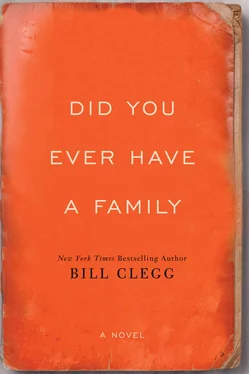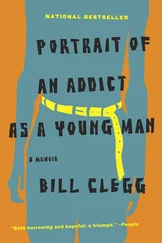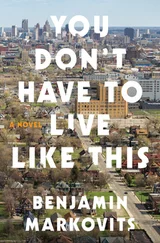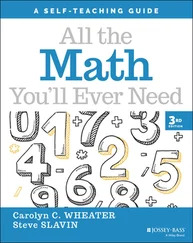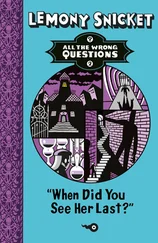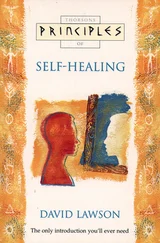Many times she came close to leaving, throwing Luke in her car and driving away. But somehow she got used to the snickering whispers in the grocery store, the nasty gazes from the women, and the lewd once-overs from the men. One year became two, became five, became so many she couldn’t count them. After Earl there were other men, but most didn’t amount to much more than a few boozy sleepovers. Only Rex, who turned up many years later, stuck around long enough to look like a future, but the wreckage he left in his wake cured Lydia of ever again expecting one. After Rex, there was no more going to places like the Tap on weekends, no more men, and no more hope left that her life would ever happen any differently than it had.
Beyond visiting Luke in prison in the Adirondacks the one time and going to Atlantic City for her honeymoon with Earl, she’d never left Wells. Some trees love an ax, a drunk old-timer mumbled one night at the Tap, back when she still went there, and something in what he said rang true, but when she later remembered what he’d said, she disagreed and thought instead that the tree gets used to the ax, which has nothing to do with love. It settles into being chipped away at, bit by bit, blade by blade, until it doesn’t feel anything anymore, and then, because nothing else can happen, what’s left crumbles to dust.
After Luke died, the phone rang a lot. The funeral home, the insurance company, the bank, the police. There were consoling calls, too, but mostly from people in Luke’s life, not hers; people who adored him and worked with him, some who were in jail with him, a few old girlfriends, ones she’d never met, and a few guys who used to swim with him in high school, his old coaches. She heard their voices as if they came from the end of a long tunnel. Their words were like echoes, and often she would hold the phone away until she sensed the talking about to come to an end. She did her best to be polite, but it was hard to hear from strangers about her son’s life, which she barely knew and had only just begun to be included in again.
Everyone she worked for called. The Moodys, the Hammonds, Peggy Riley, the Tucks, the Hills, and the Masseys, who owned the bed-and-breakfast in Salisbury where she used to drive each day to change beds, clean linens, and scrub the toilets and tubs. Even Tommy Ball called, though she hadn’t seen him in years. All of them offered their condolences and told her to take her time and to please just let them know when she was ready to come back. She never called any of them. But she did take her time, all of it, she mumbled to herself more than a few times. From the age of thirteen until the morning Betty Chandler called her, Lydia had worked nearly every day of her life. From that moment forward, she was done. She figured that with the little money she had saved, there was enough to pay her living expenses for a year or so, and carry the minimum payments on her two credit cards if she had to use them to pay for food. Without having to go to work, she barely ever drove, so she didn’t have to pay for gas. Propane and electric were included in her rent, which was only four hundred dollars a month, and the phone and cable bills were the cheapest possible.
It turned out later that Luke had a life insurance policy and Lydia was, inexplicably, the beneficiary. He also had a will, the kind you download from the Internet and get notarized, which he did. He left Lydia what he had — his savings, his landscaping company, and his belongings, which, because he’d been living at June’s, were destroyed. Between the insurance and the savings and the twenty thousand the Waller brothers paid her for the landscaping business — two trucks, a few wheelbarrows, a backhoe, and a pile of tools — she could exist as she lived now for a long time without working. For most of her life she had dreamed of the day she wouldn’t have to stoop and scrub and haul and shine for other people. And so it came. One more demon replacing another.
June never called, not once. She hugged Lydia briefly at Luke’s funeral but left town before she could say anything. Lydia wasn’t surprised given how she behaved the morning Betty Chandler called. She’d done what Betty had instructed her to do and went straight to June’s. She dropped the phone and in her slippers and robe drove the three miles to Indian Pond Road. June was squatting next to the mailbox, doubled over and away from the house, just at the top of the short, curving asphalt driveway. Lydia got out of her car and went toward her. Around them swarmed what looked like hundreds of firemen and police officers and EMTs. As she came closer, June turned her face away as if avoiding a hot flame and, as she did, held her arm up and flicked her hand toward Lydia, the way you wave away an unwanted animal, or a beggar. It was chilling, even in that unreal scene, to be greeted this way by a woman who had only ever shown her kindness. It is that gesture she remembers most clearly from that morning. Not Betty Chandler’s heartless phone call, not the red flashing lights, not the army of stunned emergency workers, not the police officer telling her that her son was dead. It was June’s hand, sending her away, the first signal that everything was about to change, had already changed, and that she was about to find out how. Those flicking, flapping fingers still jump before her eyes like a black flag snapping in the wind, commemorating all that was over. But Lydia never blamed her. Not only were her losses greater than Lydia’s that day, if losses are measured in people, but June was the one who saw it happen. Whatever she had gone through, whatever she had seen, meant that Lydia was no longer bearable.
She assumed that June blamed Luke, like so many others had. But the truth was she had no idea. What Lydia knew was that in addition to the agony of losing Luke, there was a hard and recurring stab of pain from missing June — so strange to miss another woman — this woman who she never believed she could relate to or like, let alone love. And Lydia still loved her. She had given her back her son. When June met Luke, Lydia had not spoken to her son in over eight years. Not a word since that afternoon in the freezer section of the grocery store. One year and then eight. And then June.
She appeared on Lydia’s doorstep. After no one answered her knocking, she waited on the front porch. When Lydia came home that afternoon, she saw a woman, roughly her own age, or older, who looked like every woman she’d ever worked for. Faded jeans, fit, simple but tailored cotton T-shirt, blond hair with streaks of silver pulled back in a ponytail, flashes of expensive metal at her wrists and throat and ears. She thought at first she was some weekender from the city looking to hire a housecleaner. When she introduced herself as the woman in Luke’s life— We’ve been living together this year, she said — Lydia immediately asked her to leave. She knew about June Reid. She knew where she lived and where she was from. She’d even once driven by her old stone house on Indian Pond Road between the apple orchards and the fields that led to the Unification Church property. It was surrounded by old pine and locust trees, and in the winter it looked like a Christmas card. She’d overheard people she worked for, people who knew June Reid from the city, mention how she’d taken up with a local guy, much younger. And then Bess Tuck, one of her employers who lived in the city during the week, asked her point-blank whether Lydia knew whom her son was dating. When Lydia answered that she did not, Bess told her the woman was someone who’d had dinner in this very house , she emphasized, as if it were the most spectacular and impossible coincidence.
Lydia knew about June Reid but had never seen her. And here she was. As much as she’d wondered how Luke was and what he was doing and whom with, she knew right away she couldn’t bear this woman telling her about her son. It was as if she had taken her place or succeeded where she had failed. But even if the kind of love they had was a totally different kind of love than a mother and son’s, she didn’t want it rubbed in her face by someone whose motives for being with a man so young could not be good. Leave, she said to her as she struggled to unlock the door to her apartment. I don’t know who you are and I don’t want to. Go away .
Читать дальше
